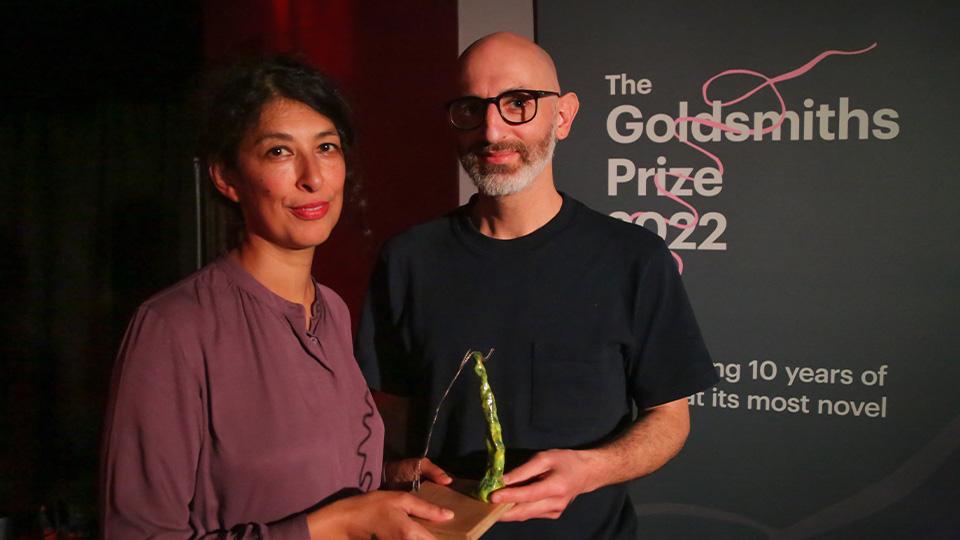
The Goldsmiths Prize is now in its tenth year, and on the occasion of the awards ceremony last week, I was prompted to reflect on the Prize itself, and what it represents.
The Goldsmiths Prize champions true creativity and genuinely novel work. The challenge it lays down is to change the rules, and to be brave enough to explore people and ideas in ways that others can’t – or won’t. It requires a special kind of creativity: one that takes courage.
“The Goldsmiths Prize was established in 2013 to celebrate the qualities of creative daring associated with the College, and to reward fiction that breaks the mould or extends the possibilities of the novel form”.
At Goldsmiths, this courage and the spirit of creative daring is in our DNA. Only in daring to do things differently, we believe, can we find and effect change.
With that in mind, my warmest congratulations go to Natasha Soobramanien and Luke Williams (pictured above) as the worthy winners in 2022, for their novel Diego Garcia.
It’s the first time in the Prize’s ten-year history that it has been awarded to a duo of authors; with a neat symmetry, that’s the amount of time I’m told it took to write.
“At its heart is an experiment with form that asks what fiction is, what art is for, and how, against the odds, to make visible, questionable and communal the structures, personal and political, of contemporary society, philosophy, lived history.”
Ali Smith CBE, Judge, on Diego Garcia
Yet, all the shortlisted and winning authors over the past ten years have shown this same spirit in their work, alongside rigorous commitment to the craft of writing. It’s this spirit, I believe, that makes the Prize so compelling for readers, as well as aspirational for our most creative authors.
Under the stewardship of my Goldsmiths colleague Tim Parnell, who conceived of and founded the Prize, it has become a beacon for true creatives.
Importantly, though, it has also made challenging modes of creativity feel more accessible to a wider audience. Three years ago on this blog, Tim spoke candidly about this aspect of the Prize.
“To me, there seemed to be an unnecessarily wide gap between the novel as it was perceived in mainstream literary culture and as it was taught and understood in university syllabi. I also felt that people were often ignoring really interesting books because they were perceived as too challenging. I could see how a prize could make a cultural intervention and help to make the marginal and ‘difficult’ popular. “
Dr Tim Parnell
Tim’s point speaks profoundly to our fundamental values here at Goldsmiths. We believe amazing things happen in the marginal spaces around the mainstream. We’re committed to taking on “difficult” work – and to bridging the gaps we see widening in front of us, in education as in society.
It’s easy to be sceptical of the popular, and to try to carve out distinct space for what we perceive as more challenging creative work. But the longevity and ever-increasing popularity of the Goldsmiths Prize tells us that this kind of work has a deeper and wider appeal than people realised.
What it needed was the right platform – a genuinely novel one. I’m delighted that it was able to find one through Goldsmiths.
The winner of the Goldsmiths Prize 2022 was announced at an award ceremony on Thursday 10 November, in association with the New Statesman. Read more about this year’s winners on the Goldsmiths website.




